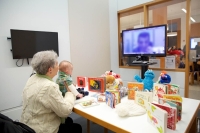TeleStory: Library-to-Jail Video Storytime
Brooklyn Public Library, N.Y.
Innovation Synopsis
BPL offers free, library-based video visitation services for families who wish to read books, sing songs, and stay connected with their incarcerated loved ones. Providing library access points across the borough ensures that separated families can easily and frequently visit and read together, creating a bridge back into the community.
Challenge/Opportunity
In New York State, 105,000 children have a parent in prison or jail. Children with an incarcerated parent are disproportionately African American and Hispanic. In some Brooklyn neighborhoods, incarceration rates are among the highest in the city and many of the children and families who are dealing with the collateral consequences of incarceration rely on the public library for support well beyond simply checking out a book. Yet TeleStory is also an expression of traditional library values. TeleStory allows families who are separated the opportunity to read together just like everyone else who walks through the doors of the library.
Key Elements of Innovation
Children participate in family video visits in library rooms that BPL staff fill with stuffed animals, books and crayons to create warm and welcoming spaces — in sharp contrast to visit rooms in jail. BPL’s video visit rooms offer privacy, but in no way are hidden, to reinforce the message that having a loved one in jail is not something to be ashamed of. BPL now has the opportunity to meet the needs of people impacted by the justice system who may lack access to traditional library services and to welcome them more fully into the library community.
Achieved Outcomes
BPL is in a position to help set the conditions for video visitation in New York state and across the country. We have established and demonstrated library-based video visitation standards that call for free and robust community access points for families, promotion of concurrent in-person family visitation, family reunification opportunities based in literacy activities, and broad partnership building to support families in social services beyond the Library’s professional capacities. In the coming year BPL will scale up the visitation service to 12 sites, setting a foundation for a national visitation model for public libraries based wholly on family reunification.

